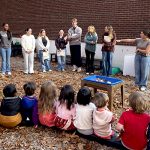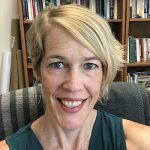Congratulations to Joan Fenton (HDFS alum), who, together with her husband, Richard Fenton, are this year’s recipients of the James C. Fallon Distinguished Service Award, the highest award given by the Brockport, NY Board of Education for their service to the district, the students, the community and the college. Learn more about their careers and work here: https://westsidenewsny.com/schools/2024-10-06/community-members-presented-with-james-c-fallon-distinguished-service-award/
Author: Janice Berriault
Keith Bellizzi featured in UConn Today article
 Professor Keith Bellizzi was featured in UConn Today in an article about his work on a new study of communication and intimacy among couples facing metastatic breast cancer: https://today.uconn.edu/2024/10/study-investigates-communication-intimacy-among-couples-facing-metastatic-breast-cancer/
Professor Keith Bellizzi was featured in UConn Today in an article about his work on a new study of communication and intimacy among couples facing metastatic breast cancer: https://today.uconn.edu/2024/10/study-investigates-communication-intimacy-among-couples-facing-metastatic-breast-cancer/
HDFS grad students and faculty present at NCFR Conference
Four HDFS faculty and three graduate students will be giving five presentations at the National Council on Family Relations (NCFR) conference later this month in Bellevue, Washington. Learn about them here: https://docs.google.com/spreadsheets/d/1Ubx8DQazSgr21R425puu1h0cVvJE1gpe_EbHBssoEDM/edit?usp=sharing
Katherine Gutierrez presents research poster at Frontiers Exhibition
Undergraduate student Katherine Gutierrez, a sophomore, participated in the Fall Frontiers Poster Exhibition on October 23rd, as part of the SHARE program, which supports undergraduate research projects in the social sciences, humanities, and arts. SHARE is designed especially for students in the earlier stages of their college careers as a means of introducing students to research in their chosen field and of developing skills they will need for further research projects. Katherine presented a poster based on her work with Dr. Sarah Rendón García titled “Platicando Juntos: Mothers Learning How to Talk to Their Children About Immigration.”
UConn Jump Start joins in reading program with HDFS Child Labs
 UConn Child Development Labs welcomed members of UConn Jump Start to participate in Read for the Record 2024. The Jumpstart members read the picture book Piper Chen Sings by Phillipa Soo to the preschoolers at Child Labs and engaged the children in conversation about the book. From the Read for the Record website: Jumpstart’s Read for the Record is the world’s largest shared reading experience, celebrating early literacy and supporting children’s early language and social-emotional development. The annual initiative raises awareness of the critical importance of early literacy and access to inclusive, high-quality books through shared reading.
UConn Child Development Labs welcomed members of UConn Jump Start to participate in Read for the Record 2024. The Jumpstart members read the picture book Piper Chen Sings by Phillipa Soo to the preschoolers at Child Labs and engaged the children in conversation about the book. From the Read for the Record website: Jumpstart’s Read for the Record is the world’s largest shared reading experience, celebrating early literacy and supporting children’s early language and social-emotional development. The annual initiative raises awareness of the critical importance of early literacy and access to inclusive, high-quality books through shared reading.
Colleen Vesely (MA’13), HDFS Alumni Spotlight, November 2024
 Colleen K. Vesely, Ph.D. completed her M.A. at UConn in HDFS in 2006. She then earned a doctorate in Family Science at the University of Maryland. At UConn, Colleen worked closely with Sara Harkness and Charlie Super on the Baby Study. She gained hands-on experience conducting research with families with young children and developed a depth of knowledge regarding the role of culture in families’ experiences and children’s development. A favorite memory from her time at UConn is traveling with the entire Baby Study lab led by Drs. Harkness and Super to The Netherlands to present findings.
Colleen K. Vesely, Ph.D. completed her M.A. at UConn in HDFS in 2006. She then earned a doctorate in Family Science at the University of Maryland. At UConn, Colleen worked closely with Sara Harkness and Charlie Super on the Baby Study. She gained hands-on experience conducting research with families with young children and developed a depth of knowledge regarding the role of culture in families’ experiences and children’s development. A favorite memory from her time at UConn is traveling with the entire Baby Study lab led by Drs. Harkness and Super to The Netherlands to present findings.
Colleen draws upon what she learned at UConn regarding working with families across cultures in her current work with students and families. Colleen is an Associate Professor and the Graduate Academic Program Coordinator in the Inclusive Early Childhood Education program at George Mason University. Colleen’s work is grounded in a critical, ecosystemic, antiracist perspective, focused on the intersection of two contexts, family and early childhood systems and considers how macro-level systemic and structural forces shape these contexts. She uses Community-based Participatory Action Research (CBPAR) and other emancipatory approaches to examine and center the experiences and roles of primary caretakers and teachers in young children’s lives. In addition, Colleen teaches courses on families and family partnership and qualitative methods.
Over the last 10 years, using CBPAR approaches, Colleen has worked with families and child- and family-serving institutions across northern Virginia to understand and center families who experience marginalization to co-create knowledge that informs attuned, aligned, and responsive programs, policies, and practices. Much of this work is conducted using Community Advisory Boards or Family Councils, a hallmark of CBPAR work, to shift power back to communities—especially communities where systems were not built. Most recently, Colleen and collaborators were awarded a Spencer Foundation Vision Grant focused on early childhood systems change for educational equity.
Colleen continues to remain connected to UConn HDFS . Specifically, in support of the Administration for Children and Families and the Office of Planning, Research, and Evaluation Child Care and Early Education Policy and Research Consortium, Colleen is facilitating a national research collaborative focused on reimagining family partnership in early education and child care. Vanessa Esquivel, a current HDFS doctoral student is co-facilitating this collaborative, and faculty member, Kevin Ferreira van Leer is a key member of this collaborative. Colleen and Kevin also led a webinar for the National Council on Family Relations focused on immigrant families and immigration policy. Colleen would love to connect and collaborate with other UConn faculty and students whose work focuses on participatory approaches with immigrant families who have young children. She is always looking to engage and learn with other scholars, family leaders, and community leaders regarding the big visions and the nitty gritty details/logistics of reimagining family partnership vis-a-vis family-centered systems change.
Colleen has three children, ages 14, 11, and 7, who keep her very busy with their swim, marching band, art and cross-country schedules. To relax and rejuvenate her spirit, Colleen likes to spend time outside with her husband, children, and their family’s black Lab named Puma.
Sumin Kim, HDFS Graduate Student Spotlight, November 2024
 Sumin Kim is a first-year PhD student working with Dr. Annamaria Csizmadia, specializing in Diversity and Culture. Originally from Seoul, Korea, Sumin lived in the Netherlands, Dubai, and Germany before moving to the United States. Her diverse international experiences have significantly shaped her research interests in multicultural identities and the psychological complexities faced by children navigating multiple cultures. Sumin earned her bachelor’s from Sungkyunkwan University in Korea, with a double major in Psychology and Child Psychology & Education, focusing on child development. She then pursued a master’s degree in Child Development and Family Studies at Yonsei University, where she integrated youth development with an understanding of societal influences on developmental trajectories. During her master’s program, Sumin led counseling sessions at a regional children’s center, focusing on racial-ethnic socialization to help multiracial youth adapt to Korean society. In her master’s thesis she explored the psychological challenges faced by Korean multicultural youth returning after living abroad, emphasizing the critical role of social support in navigating cultural identity issues. After completing her master’s, Sumin worked as a researcher at Seoul National University’s Child and Adolescent Psychiatry Lab, contributing to projects on minority children with neurodevelopmental disorders. She later worked as a psychotherapist, helping multicultural children develop social and academic skills to adjust to mainstream society, which gave her firsthand experience of how multiculturalism impacts psychological well-being.
Sumin Kim is a first-year PhD student working with Dr. Annamaria Csizmadia, specializing in Diversity and Culture. Originally from Seoul, Korea, Sumin lived in the Netherlands, Dubai, and Germany before moving to the United States. Her diverse international experiences have significantly shaped her research interests in multicultural identities and the psychological complexities faced by children navigating multiple cultures. Sumin earned her bachelor’s from Sungkyunkwan University in Korea, with a double major in Psychology and Child Psychology & Education, focusing on child development. She then pursued a master’s degree in Child Development and Family Studies at Yonsei University, where she integrated youth development with an understanding of societal influences on developmental trajectories. During her master’s program, Sumin led counseling sessions at a regional children’s center, focusing on racial-ethnic socialization to help multiracial youth adapt to Korean society. In her master’s thesis she explored the psychological challenges faced by Korean multicultural youth returning after living abroad, emphasizing the critical role of social support in navigating cultural identity issues. After completing her master’s, Sumin worked as a researcher at Seoul National University’s Child and Adolescent Psychiatry Lab, contributing to projects on minority children with neurodevelopmental disorders. She later worked as a psychotherapist, helping multicultural children develop social and academic skills to adjust to mainstream society, which gave her firsthand experience of how multiculturalism impacts psychological well-being.
At UConn, Sumin’s research focuses on how cultural factors, such as ethnic-racial identity and racial socialization, shape the developmental trajectories and socialization processes of multicultural youth. Her work delves into understanding acculturation experiences of immigrant populations, with particular emphasis on identifying the protective factors and strengths that support multicultural youth through these transitions. Through her research, she aims to lay the foundation for interventions that address inequity and discrimination, ultimately fostering a more inclusive and supportive environment for multicultural youth.
Outside of her academic work, Sumin enjoys swimming, skiing, traveling, and taking photos. As this is her first time living in the United States, she is excited to explore the area and experience the local culture. Embracing this new chapter, she hopes to broaden her personal and cultural horizons during her time in the U.S.
Beth Russell, HDFS Faculty Spotlight, November 2024
Beth was promoted to Professor effective August, 2024!
 Beth Russell has spent 20 years studying psychological distress and how people manage it. Her studies examine how individuals and families respond to stress across a range of typical life events (like the transition to parenthood) and atypical experiences (caregiving in the context of chronic health conditions). Her most recent work examines the multi-level influences that shape people’s responses to stress, spanning individual, social, and place-based factors over time. She is currently on several teams funded by both internal and external awards to develop and test interventions that target the regulation of distress to improve psychosocial outcomes.
Beth Russell has spent 20 years studying psychological distress and how people manage it. Her studies examine how individuals and families respond to stress across a range of typical life events (like the transition to parenthood) and atypical experiences (caregiving in the context of chronic health conditions). Her most recent work examines the multi-level influences that shape people’s responses to stress, spanning individual, social, and place-based factors over time. She is currently on several teams funded by both internal and external awards to develop and test interventions that target the regulation of distress to improve psychosocial outcomes.
Families are a primary source of support during times of stress. Much of the modeling close loved ones provide about how to manage challenges is shaped by attitudes about stress and the coping behaviors that might (or might not) be useful in a given situation. The range of supports to cope with stress extend far beyond family influences to include informal supports like friends/peers, and formal supports including help-seeking through treatment providers. Beth’s work across different stressful situations demonstrates that there are subgroup patterns in help-seeking which ultimately impact coping strategies. For example, young men tend to be strikingly absent from clinical trials and community-based service provision, indicating meaningful gaps in our understanding of help-seeking in times of stress. Describing the unique distress and resilience trajectories among subgroups at heightened risk for mental health struggles is an important step in tailoring accessible and equitable interventions for those with the greatest needs. Beth and her HDFS colleague Kari Adamsons won the National Council on Family Relations 2024 Men in Families Focus Group Best Research Paper Award for their coauthored work “Longitudinal transmission of risk behaviors between mothers, fathers, and adolescents” published in the Journal of Family Psychology.
Beth became the Director of the Center for Applied Research in Human Development (CARHD) in 2018, where she has over a decade of experience directing evaluations of human service programs that provide supports to disadvantaged communities, helping programs identify what works best for whom within their client populations. Beth also holds two editorial board member seats for the journals New Directions for Evaluation and Child Psychiatry and Human Development.
Outside of work, Beth spends time with her family, in her gardens and art studio, and connecting with friends over good food. Three generations of her family love coming together from around the country to travel to the best beaches, jungles, waterfalls, and caves every summer – next up in 2025: SCUBA diving a Pacific Island volcano crater!
Sarah Rendón-García featured in documentary on migration trauma
 Sarah Rendón-García collaborated and is featured in the short-form documentary “Invisible Wounds: Unveiling Migration Trauma.” Directed by Oscar Guerra, an Associate Professor of Film and Video Production at UConn, this documentary recently premiered on PBS. You can watch it here (https://www.pbs.org/video/invisible-wounds-6zwok9/).
Sarah Rendón-García collaborated and is featured in the short-form documentary “Invisible Wounds: Unveiling Migration Trauma.” Directed by Oscar Guerra, an Associate Professor of Film and Video Production at UConn, this documentary recently premiered on PBS. You can watch it here (https://www.pbs.org/video/invisible-wounds-6zwok9/).
HDFS faculty and graduate students highlighted in InCHIP report
Check out the HDFS faculty and graduate students highlighted in the InCHIP Annual report: Rachel Chazan Cohen, Raymond Moody, Ryan Watson, Lisa Eaton, *Peter McCauley, and Keith Bellizzi.